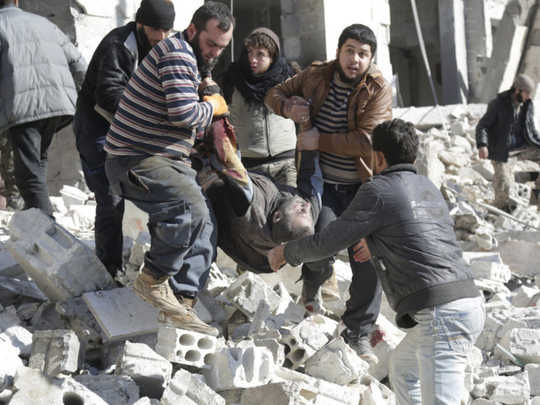
Munich: France led international criticism of Russia on Saturday for bombing civilians in Syria, a charge Russian Prime Minister Dmitry Medvedev rejected as major powers bickered openly just a day after they agreed a pause in combat in Syria.
The differences between the stakeholders in a Syria settlement highlighted their lingering divisions despite Friday’s “cessation of hostilities” agreement, which was not signed by any of the warring parties on the ground — government forces and the opposition — and does not take effect for a week. US Secretary of State John Kerry accused Russia on Saturday of hitting legitimate opposition groups and civilians with its bombing campaign in Syria and said Moscow must change its targets to respect a ceasefire deal clinched on Friday.
“To date, the vast majority of Russia’s attacks have been against legitimate opposition groups. To adhere to the agreement it made, Russia’s targeting must change,” Kerry told a security conference in Munich.
He accused Russia of dropping so-called “dumb bombs” in Syria that do not have a precise target, saying this has led to the killing of civilians.
French Prime Minister Manuel Valls, in a head-to-head debate with Medvedev at a security conference in Munich, pressed Russia to stop bombing civilians in Syria, saying this was crucial for achieving peace in the country.
“France respects Russia and its interests ... But we know that to find the path to peace again, the Russian bombing of civilians has to stop,” Valls told the conference.
The major powers clinched their deal on a pause in combat in late night talks in Munich on Friday, at a time when Syrian President Bashar Al Assad’s government is poised to score its biggest victory over rebels — in Aleppo, Syria’s biggest city before the war — with the backing of Russian air power.
If implemented, the truce deal would allow humanitarian aid to reach besieged towns. But several Western countries have said there is no hope for progress without a halt to the Russian bombing, which has decisively turned the balance of power in favour of Al Assad after almost five years of conflict.
Late on Friday, Turkey’s foreign minister said Russia was targeting schools and hospitals with its bombing. Mevlut Cavusoglu put the blame squarely on Moscow for the wave of tens of thousands of displaced people who have arrived at the Turkish border over the past week.
Medvedev rejected the accusations as “just not true”.
“There is no evidence of our bombing civilians, even though everyone is accusing us of this,” Medvedev told the Munich conference moments after Valls, seated next to him, said Russian bombing of civilians must stop.
“Russia is not trying to achieve some secret goals in Syria.
We are simply trying to protect our national interests,” Medvedev said, adding that Moscow wanted to prevent militant extremists getting to Russia.
The Syrian Observatory for Human Rights, which tracks the conflict, reported on Saturday that Syrian government forces were poised to advance into Daesh stronghold of Raqqa province and allied Russian jets kept up air strikes on rebel-held towns north of Aleppo.
Russia’s assertive posture in Syria and over Ukraine has raised diplomats’ concerns about geopolitical instability.
Medvedev said Nato’s stance towards Russia was hostile.
“You could say even more sharply: we have fallen into a new Cold War,” he said. “Nearly on a daily basis, we are being blamed for the most terrible threat to Nato as a whole, to Europe, to America, to other countries.
“They make scary movies where Russia starts a nuclear war. I sometimes wonder — are we in 2016 or 1962?” Reacting to Medvedev’s comments, Lithuanian President Dalia Grybauskaite told the conference the situation was more serious.
“We are probably facing a hot war,” Grybauskaite said.
“Russia is demonstrating open military aggression in Ukraine, open military aggression in Syria. There is nothing cold about this, it is very hot.”












